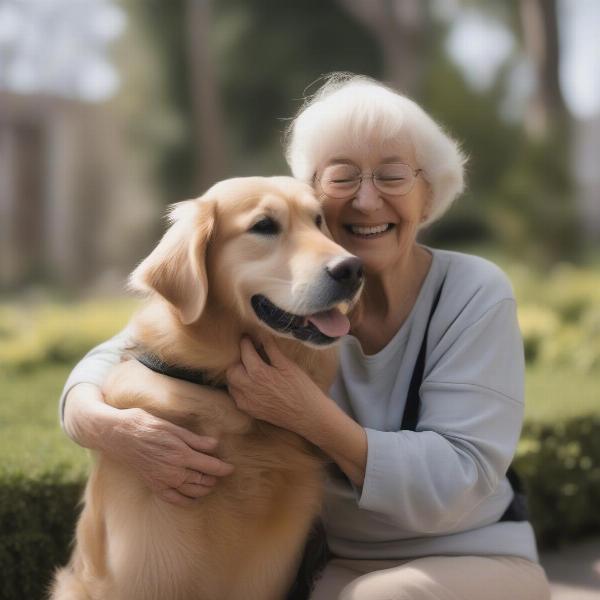Service dogs can significantly improve the lives of elderly individuals, offering companionship, assistance with daily tasks, and increased independence. Whether facing physical limitations, cognitive decline, or simply the challenges of aging, a service dog can provide invaluable support and enhance overall well-being. This article will explore the various ways service dogs can help the elderly, the types of service dogs available, and the process of acquiring one.
Types of Service Dogs for Seniors
Several types of service dogs are particularly well-suited to assist seniors. These include:
- Mobility Assistance Dogs: These dogs are trained to help with tasks like retrieving dropped items, opening doors, pulling wheelchairs, and providing balance support.
- Hearing Dogs: For seniors with hearing impairments, hearing dogs can alert them to important sounds like doorbells, smoke alarms, and ringing phones.
- Medical Alert Dogs: These highly trained dogs can detect changes in a person’s medical condition, such as an oncoming seizure or a drop in blood sugar, and alert them or their caregivers.
- Psychiatric Service Dogs: Seniors experiencing anxiety, depression, or PTSD can benefit from the emotional support and calming presence of a psychiatric service dog. They can be trained to interrupt anxiety attacks, provide deep pressure therapy, and retrieve medication.
Choosing the Right Service Dog
Selecting the right service dog is crucial. Consider the senior’s specific needs, lifestyle, and living situation. For example, a small dog might be more suitable for someone living in an apartment, while a larger dog might be better for an individual requiring significant mobility assistance.
Acquiring a Service Dog
The process of acquiring a service dog involves several steps:
- Assessment: A thorough assessment of the senior’s needs and abilities is essential.
- Application: Apply to a reputable service dog organization.
- Training: The dog is specifically trained to meet the individual’s needs. This training can take several months or even years.
- Matching: The senior is matched with a compatible dog.
- Team Training: The senior and dog undergo joint training to learn how to work together effectively.
Financial Considerations
The cost of acquiring a service dog can be significant. Explore funding options such as grants, fundraising, and insurance coverage.
Benefits of Service Dogs for the Elderly
Service dogs provide numerous benefits for seniors:
- Increased Independence: By assisting with daily tasks, service dogs enable seniors to maintain their independence and live more fulfilling lives.
- Improved Physical Health: Mobility assistance dogs encourage physical activity and reduce the risk of falls.
- Enhanced Emotional Well-being: The companionship and unconditional love of a service dog can alleviate loneliness, reduce stress, and improve overall mental health.
 Elderly Woman Hugging Her Service Dog
Elderly Woman Hugging Her Service Dog - Greater Social Interaction: Service dogs can act as social catalysts, facilitating conversations and interactions with others.
- Increased Safety and Security: Medical alert dogs and hearing dogs provide an added layer of safety and security for seniors.
Conclusion
Service dogs can be transformative companions for elderly individuals, offering practical assistance, emotional support, and a renewed sense of independence. By carefully considering the senior’s needs and following the proper acquisition process, the benefits of a service dog partnership can be truly life-changing. If you or a loved one is considering a service dog, research reputable organizations and explore the resources available to make this valuable partnership a reality.
FAQ
- How much does a service dog cost? The cost of a service dog can vary greatly depending on the type of training required and the organization providing the dog, ranging from several thousand to tens of thousands of dollars.
- How long does it take to get a service dog? The waiting time for a service dog can be lengthy, often taking several months or even years due to the extensive training involved.
- Are service dogs allowed everywhere? Service dogs are generally allowed in most public places, including stores, restaurants, and transportation, according to the Americans with Disabilities Act (ADA).
- What is the difference between a service dog and an emotional support animal? Service dogs are specifically trained to perform tasks for individuals with disabilities, while emotional support animals provide comfort and companionship but do not have the same level of training or public access rights.
- What breeds make good service dogs? Several breeds are commonly used as service dogs, including Golden Retrievers, Labrador Retrievers, and German Shepherds, due to their intelligence, temperament, and trainability.
- Can my existing dog become a service dog? While it is possible for an existing dog to be trained as a service dog, it depends on the dog’s temperament, age, and health. A professional assessment is necessary to determine suitability.
- Where can I find more information about service dogs for the elderly? Reputable service dog organizations and disability advocacy groups can provide valuable resources and information.
Related Articles:
- service dogs for dementia
- elderly dog daycare
- elderly dog panting
- essex therapy dogs
- indoor grass pad for dogs
About ILM Dog:
ILM Dog is a leading international online resource dedicated to providing expert advice on all aspects of dog care and well-being, from breed selection and puppy care to senior dog health and specialized training. We are passionate about helping dog owners create strong, loving bonds with their canine companions. Whether you’re a new dog owner or a seasoned expert, ILM Dog offers valuable insights into nutrition, grooming, training, and behavior. For expert advice tailored to your dog’s unique needs, contact us at [email protected] or +44 20-3965-8624.